Text
time blocking method
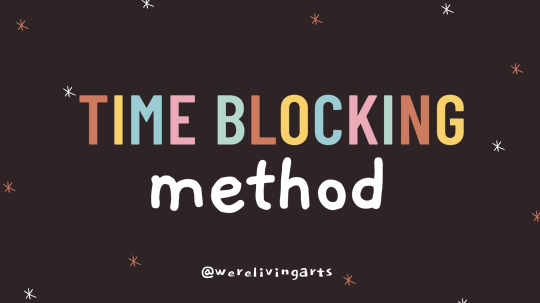
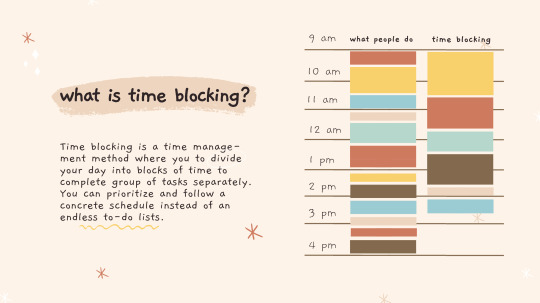
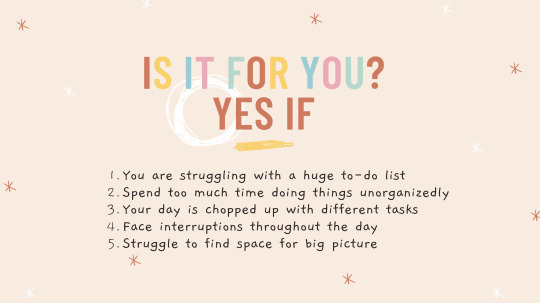
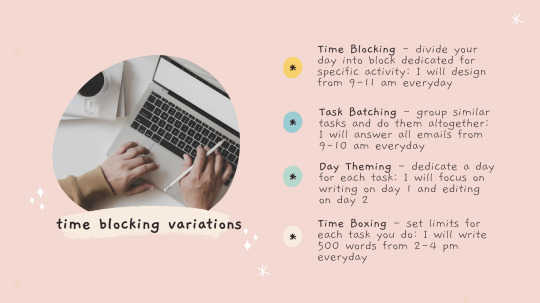
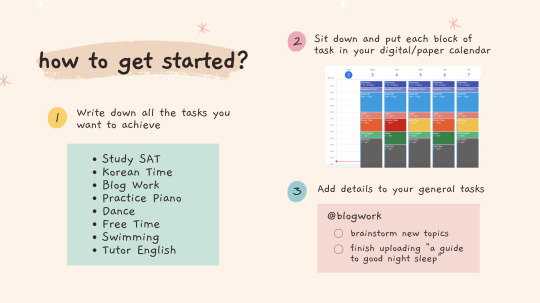

Hi all, this is werelivingarts, a new post about time management method: TIME BLOCKING! Time blocking allows you to divide your day into big blocks and helps you to complete similar tasks in one-go without any interruptions!
You can do your time blocking on:
Google Calendar (simple and easy to use)
Plan (drag your to-do list and organize them in blocks)
TickTick Premium (offer pomodoro timer)
Hope you find this helpful! ⭐️
7K notes
·
View notes
Note
Hello!! I want to learn modern standard arabic. I’m moving to Dubai in a year and I want to be prepared hehe. I did learn a lot from your blog, I was wondering how I could learn it faster. Could you help me?
Hello, anon!
It’s wonderful that you’re feeling so motivated to learn the language! I’ll try my best to help you.
First, I would like to redirect you to this Arabic apps master-list [link] by @wonderful-language-sounds. It has so many interesting apps that could help you.
I’m happy to hear that you found my blog helpful. Here are some tips that I recommend to help you learn Arabic faster :
1- Try to watch as many movies and tv shows in Arabic as possible. Using a textbook to learn is very useful, but I believe that hearing the words and expressions applies in different situations by speakers will help you understand them and memorize them easier. The tv show can be anything you, whether they are Arabic dramas or the Arabic dubbed version of your favorite drama (many foreign dramas especially East Asian dramas get dubbed into Modern Standard Arabic) or animated series or animated movie.
2- When you’re watching something in Arabic, try to have a small note book to write down the new words or expressions that you found interesting. This will help you build up your vocabulary.
3- Listen to music. There are artists like Rim Banna, Kathem Alsaher, Hmood Alkhadr, Marcel Khaleefa, and Abdul Rahman Mohammed who sing in Modern Standard Arabic so give their songs a try. Music is a way to learn Arabic words “on the go” while you’re doing something else and don’t feel like taking a pen an a paper and going in study mood.
4- When you’re organizing the vocabulary, try to organize the words in certain categories rather than alphabetical order. It helps you link them together and organize them in your mind.
5- Don’t forget studying the grammar to understand the structure of sentences and the language, starting with the alphabets! Take your time to learn the alphabets, even if it takes you longer than you expect. Remember that it’s a good investment of your time to learn the alphabets so that you will lessen your dependence on transliteration and make it easier for you to learn new vocabulary.
6- As for reading, since you will need diatrics I have made a list for beginners [link] and here’s a link for audio books so that it will help you read the books that don’t have diatrics in them. [link]
7- It’s important to set goals and be motivated but be sure not to pressure yourself. Study at a pace you’re comfortable with so that the journey will be more enjoyable. I made a post about self studying [link] and other studying tips [link].
In addition to this, I’ll link you to a previous ask, which I hope you’ll find helpful [link].
Feel free to check my [grammar posts] and [vocabulary posts] if you haven’t already,
132 notes
·
View notes
Note
Hey! I was wondering if you have any websites to learn the Moroccan dialect of Arabic, and which is the best. Thanks!
Hello, anon.
Here’s a list of references for the Moroccan dialect. In my opinion, start with the free courses and the pdf file books so that you can familiarize yourself with it. Then you can start with the courses. I didn’t try the courses but the Udemy course seems interesting. I also found a website that has recommendation for learning materials with a short explanation about why they recommend these books [link].
I. Online courses
Udemy Moroccan Arabic course [link]
Loecsen website : Moroccain Arabic phrase book (with audio) [link]
Learn Moroccain Arabic Website [link]
Useful phrases in Moroccan Arabic [link]
Moroccan Arabic phrases [link]
Introductions and useful phrases in Moroccan darija [link]
Moroccan Arabic flashcards [link]
Memrize beginners darija course [link]
Armchair Arabist blog : Moroccan darija [link]
Livelingua course : Moroccan Arabic [link]
II. Books
Moroccan Arabic book pdf [pdf link]
Learn Moroccan darija book [pdf link]
Basic introduction to darija [pdf link]
Moroccan Arabic textbook [pdf link]
A basic course in Moroccan Arabic [link]
Advanced Moroccan Arabic [link]
Moroccan Arabic verb dictionary [link]
A practical guide to Moroccan darija [link]
Conversational Arabic Quick and Easy: Moroccan Dialect [link]
A Dictionary of Moroccan Arabic [link]
An Introduction to Moroccan Arabic and Culture [link]
III. YouTube videos
Moroccan Arabic: most used expressions [link]
500 most used Moroccan words for beginners (this video has severalparts) [link]
Common expressions in Moroccan Arabic [link]
Learn Moroccan darija [link]
Learn Moroccan Arabic with podcasts [link]
Moroccan Arabic vocabulary (colors) [link]
Important verbs in Moroccan Arabic [link]
Making requests in Moroccan darija (check out this channel,it has other interesting videos) [link]
6 question words in Moroccan darija [link]
Count from 1 to 10 in Moroccan darija [link]
Moroccan Arabicaudiobook [link]
Moroccan Arabic lessons [link]
Moroccan Arabic : subject pronouns [link]
Good luck!! Wish you the best of luck.
235 notes
·
View notes
Note
Do you have any tips on learning Arabic?
I have some good tips to start learning any language you want and it will definitely work for Arabic.
Here are my tips for you:
Getting Down to the BasicsLearn pronunciation. Know your learning style. Decide if you’re a visual, auditive or kinesthetic learner.
Pay attention to the grammarThis is probably the most important part of the language besides the vocabulary. It doesn’t matter if you follow a polyglot’s online method like or you have joined a class at the local college (that’s how I learned the grammar of all my target languages). Look at the structure of the language and how the articles work (masculine, feminine, neutral). Getting a handle on the structure of the language will help you understand how it fits together once you start learning different words.
Memorize a number of words and phrases each day.Start with the most common words. Memorization is half the battle and there are many different ways to memorize. here is an example here & here, other langblrs make very useful vocabulary lists like this one here.Try using the words in various and different sentences. This will help you practice the words and make it easier to recall the words when you need them.Don’t forget to keep practicing the words once you move on to memorizing other words. If you don’t practice them you will forget them.
Listen. Listening to the language, be it from movies or television shows, through audio language courses or music can help you retain the words you’re trying to learn. Use audio books or audio language lessons.
Read in your chosen language. Start off with simpler books and, as you get better, move on to more difficult ones. Challenge yourself to read without a dictionary and let yourself puzzle the meanings out by yourself.
Speak with native speakers. If you don’t speak the language, you are unlikely to learn it well and keep it in your memory.
here are some useful links and resources:
Complete Online Arabic Resources
Arabic Learning Resources
Arabic Language Resources
Arabic Masterpost
Learning Arabic Masterpost
Lessons on the Arabic script.
Arabic script tutorial
Arabic script lessons.
Blank Arabic Verb Conjugation Sheet PDF
Arabic Grammar:
Arabic Grammar
My Arabic website
Arabic Grammar
Learn Arabic
Easy Arabic PDF
Arabic Grammar
I highly recommend that you check this post here.
I sincerely hope you find this helpful if you still have any questions my inbox is always open :)
359 notes
·
View notes
Note
Hey do you have any links to learning Arabic or Farsi? I'm looking into learning more about the Middle East and it seems learning those two languages would help plenty
Sure! :D
Arabic
Arabic Learning Resources
Arabic Language Resources
Arabic Language Apps
Moroccan Masterpost
Free Arabic Resources
Here are some blogs that post about Arabic:
@arabic-langblr
@rahaflearns
@arabskaya-devushka
@arabicinenglish
@thearabicdepository
@arabicgrammarfornerds
@learnarabicin25years
Farsi:
Persian Language Masterpost
Here are some blogs that post about Farsi:
@persian-verbs (run by @keinejavab)
@heliophobique
@lingotango
I’m sure that there are more blogs, but this is all that I could think of right now. I hope this helps!
683 notes
·
View notes
Text
Languages 101: a language learning guide by a polyglot

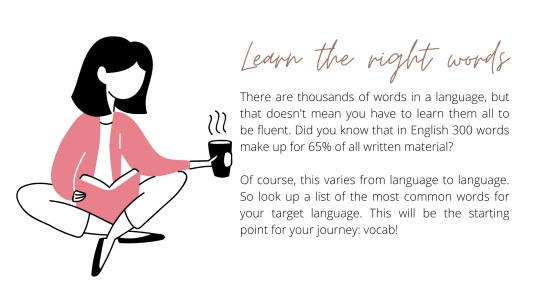
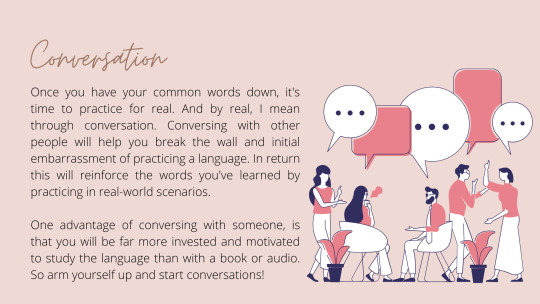
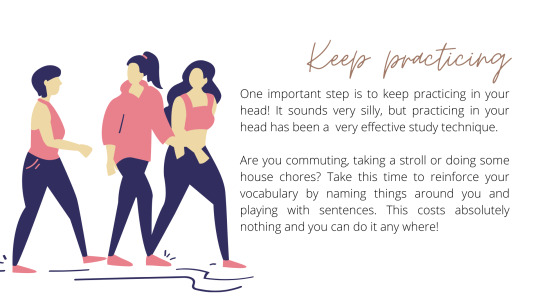
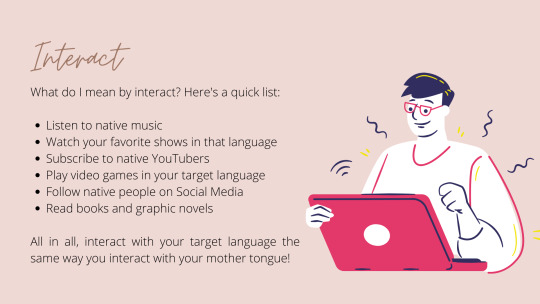

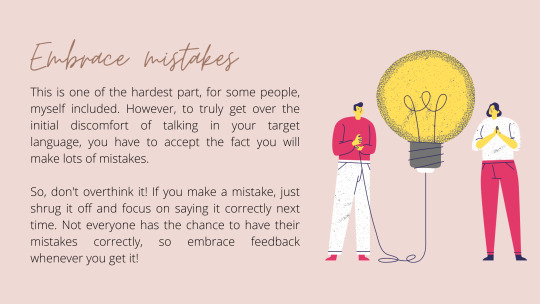
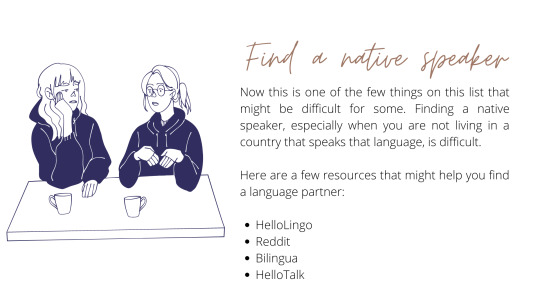
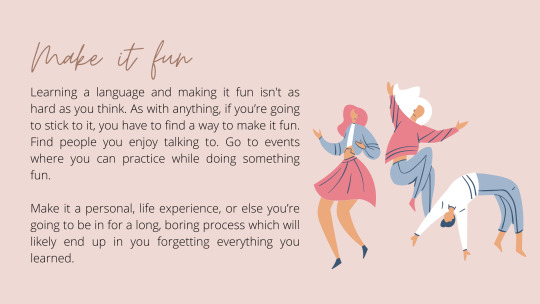

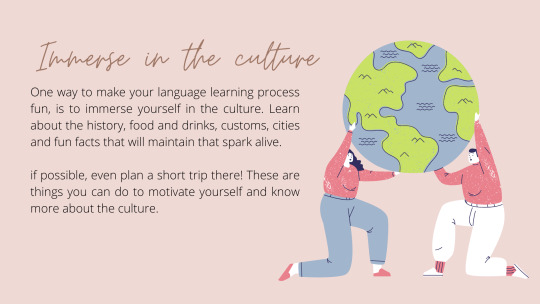
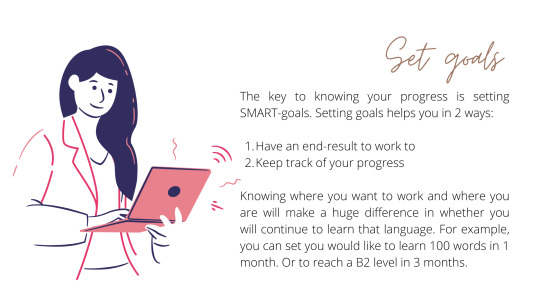
Hey, guys. Lala here! As polyglot who speaks 5 languages and learning more, I’ve been through my fair share of language learning experiences. Here, I wanted to share some tips with you guys that have helped me along my journey.
What are some language learning tips that have helped you guys? Share them with me! Do you have a question? Don’t be afraid to leave me an ask!
Read more of my content here:
5 tips on how to be productive when studying from home
My study routine for ultimate productivity
Minimalist student toolkit
Written by @lalavscollege
3K notes
·
View notes
Text
How to learn a language when you don’t know where to start:
General Plan:
Weeks 1 and 2:
Purpose:
Learn the fundamentals sentence construction
Learn how to spell and count
Start building a phrase stockpile with basic greetings
The Alphabet
Numbers 1 - 100
Subject Pronouns
Common Greetings
Conjugate the Two Most Important Verbs: to be and to have
Basic Definite and Indefinite Articles
Weeks 3 and 4:
Purpose:
Learn essential vocabulary for the day-to-day
Start conjugating regular verbs
Days of the Week and Months of the Year
How to tell the time
How to talk about the weather
Family Vocabulary
Present Tense Conjugations Verbs
Weeks 5 and 6:
Purpose:
Warm up with the last of the day-to-day vocabulary
Add more complex types of sentences to your grammar
Colours
House vocabulary
How to ask questions
Present Tense Conjugations Verbs
Forming negatives
Weeks 7 and 8:
Purpose:
Learn how to navigate basic situations in a region of your target language country
Finish memorising regular conjugation rules
Food Vocabulary and Ordering at Restaurants
Money and Shopping Phrases
Present Tense Conjugations Verbs
Weeks 9 and 10:
Purpose:
Start constructing descriptive and more complex sentences
Adjectives
Reflective verbs
Places vocabulary
Weeks 11 and 12:
Purpose:
Add more complex descriptions to your sentences with adverbs
Wrap up vocabulary essentials
Adverbs
Parts of the body and medical vocabulary
Tips for Learning a Foreign Language:
Learning Vocabulary:
What vocabulary should I be learning?
There are hundreds of thousands of words in every language, and the large majority of them won’t be immediately relevant to you when you’re starting out.Typically, the most frequent 3000 words make up 90% of the language that a native speaker uses on any given day. Instead try to learn the most useful words in a language, and then expand outwards from there according to your needs and interests.
Choose the words you want/need to learn.
Relate them to what you already know.
Review them until they’ve reached your long-term memory.
Record them so learning is never lost.
Use them in meaningful human conversation and communication.
How should I record the vocabulary?
Learners need to see and/or hear a new word of phrase 6 to 17 times before they really know a piece of vocabulary.
Keep a careful record of new vocabulary.
Record the vocabulary in a way that is helpful to you and will ensure that you will practice the vocabulary, e.g. flashcards.
Vocabulary should be organised so that words are easier to find, e.g. alphabetically or according to topic.
Ideally when noting vocabulary you should write down not only the meaning, but the grammatical class, and example in a sentence, and where needed information about structure.
How should I practice using the vocabulary?
Look, Say, Cover, Write and Check - Use this method for learning and remembering vocabulary. This method is really good for learning spellings.
Make flashcards. Write the vocabulary on the front with the definition and examples on the back.
Draw mind maps or make visual representations of the new vocabulary groups.
Stick labels or post it notes on corresponding objects, e.g when learning kitchen vocabulary you could label items in your house.
How often should I be practising vocabulary?
A valuable technique is ‘the principle of expanding rehearsal’. This means reviewing vocabulary shortly after first learning them then at increasingly longer intervals.
Ideally, words should be reviewed:
5-10 minutes later
24 hours later
One week later
1-2 months later
6 months later
Knowing a vocabulary item well enough to use it productively means knowing:
Its written and spoken forms (spelling and pronunciation).
Its grammatical category and other grammatical information
Related words and word families, e.g. adjective, adverb, verb, noun.
Common collocations (Words that often come before or after it).
Receptive Skills: Listening and Reading
Reading is probably one of the most effective ways of building vocabulary knowledge.
Listening is also important because it occupies a big chunk of the time we spend communicating.
Tips for reading in a foreign language:
Start basic and small. Children’s books are great practice for beginners. Don’t try to dive into a novel or newspaper too early, since it can be discouraging and time consuming if you have to look up every other word.
Read things you’ve already read in your native language. The fact that you at least know the gist of the story will help you to pick up context clues, learn new vocabulary and grammatical constructions.
Read books with their accompanying audio books. Reading a book while listening to the accompanying audio will improve your “ear training”. It will also help you to learn the pronunciation of words.
Tips for listening in a foreign language:
Watch films in your target language.
Read a book while also listening along to the audio book version.
Listen to the radio in your target language.
Watch videos online in your target language.
Activities to do to show that you’ve understood what you’ve been listening to:
Try drawing a picture of what was said.
Ask yourself some questions about it and try to answer them.
Provide a summary of what was said.
Suggest what might come next in the “story.”
Translate what was said into another language.
“Talk back” to the speaker to engage in imaginary conversation.
Productive Skills: Speaking and Writing
Tips for speaking in a foreign language:
If you can, try to speak the language every day either out loud to yourself or chat to another native speaker whether it is a colleague, a friend, a tutor or a language exchange partner.
Write a list of topics and think about what you could say about each one. First you could write out your thoughts and then read them out loud. Look up the words you don’t know. You could also come up with questions at the end to ask someone else.
A really good way to improve your own speaking is to listen to how native speakers talk and imitate their accent, their rhythm of speech and tone of voice. Watch how their lips move and pay attention to the stressed sounds. You could watch interviews on YouTube or online news websites and pause every so often to copy what you have just heard. You could even sing along to songs sung in the target language.
Walk around the house and describe what you say. Say what you like or dislike about the room or the furniture or the decor. Talk about what you want to change.This gets you to practise every day vocabulary.
Tips for writing in a foreign language:
Practice writing in your target language. Keep it simple to start with. Beginner vocabulary and grammar concepts are generally very descriptive and concrete.
Practice writing by hand. Here are some things you can write out by hand:
Diary entries
Shopping lists
Reminders
What could I write about?
Write about your day, an interesting event, how you’re feeling, or what you’re thinking.
Make up a conversation between two people.
Write a letter to a friend, yourself, or a celebrity. You don’t need to send it; just writing it will be helpful.
Translate a text you’ve written in your native language into your foreign language.
Write a review or a book you’ve recently read or a film you’ve recently watched.
Write Facebook statuses, Tweets or Tumblr posts (whether you post them or not will be up to you).
Write a short story or poem.
Writing is one of the hardest things to do well as a non-native speaker of a language, because there’s no room to hide.
There are lots of ways to improve your writing ability, but they can be essentially boiled down to three key components:
Read a lot
Write a lot
Get your writing corrected
28K notes
·
View notes
Text
From Beginner to Intermediate: an intense plan for advancing in language
Introduction
I studied Spanish at school for 3 years and now I'm at a low B1 level. I can actually understand pretty well while listening or reading but I can't communicate fluently.
This plan will include vocabulary build up, some grammar revision, a lot of listening, reading and writing. And could be used for the most languages, not only Spanish.
Plan
Every day:
Conjugate one verb in present, past and future tenses
Make a list about 10 - 30 words long
Create flashcards with them and start learning them (I use Quizlet for flashcards)
Revise yesterday's set of flashcards
2-3 times a week:
Read an article or a few pages from a book
Write a few sentences about anything in your target language
Listen to one episode of podcast (at least one)
Once a week or every two weeks:
Watch a movie in your target language, preferably animated movie as the language used there is easier. You can watch with subtitles
Grammar exercises
Translate some short text
Once a month:
Write something longer, like an essay or report, on chosen topic
Additionally:
Talk to yourself, to your friends, to your pets
Text with someone
Look at the transcription while listening to the podcast for second time
Repeat what you hear (in podcast or movie)
Check words you don't know from the listening and reading
Read out loud
Listen to music in your target language - you can even learn the text and sing along
Watch YouTube in your target language
Change your phone language to the one you're learning
Think in you target language!!!
***This is very intense plan for self-learners, you don't have to do all of these things in the given time. Adjust it to your own pace. I'll try to stick to this, if I have enough time.***
10K notes
·
View notes
Note
Hey do you have any links to learning Arabic or Farsi? I'm looking into learning more about the Middle East and it seems learning those two languages would help plenty
Sure! :D
Arabic
Arabic Learning Resources
Arabic Language Resources
Arabic Language Apps
Moroccan Masterpost
Free Arabic Resources
Here are some blogs that post about Arabic:
@arabic-langblr
@rahaflearns
@arabskaya-devushka
@arabicinenglish
@thearabicdepository
@arabicgrammarfornerds
@learnarabicin25years
Farsi:
Persian Language Masterpost
Here are some blogs that post about Farsi:
@persian-verbs (run by @keinejavab)
@heliophobique
@lingotango
I’m sure that there are more blogs, but this is all that I could think of right now. I hope this helps!
683 notes
·
View notes
Text
Data Science Learning Path for Absolute Beginners Like Me
Understanding Data Science for Beginners:
Data science is an inter-disciplinary field where you work with data (of course!) and can be implemented in various sectors such as sports, traveling, social media, health care, banking, marketing and in all kinds of stuff.
If you want to learn more about it, here is a web post.
What Is Data Science? A Beginner's Guide To Data Science | Edureka
My purpose to learn Data Science:
I have a background in life science but I lack the adequate knowledge in data science to advance my career in health care and bio tech industry.
Insecurities/Obstacles:
I have a background in life science but I lack the adequate knowledge in data science to advance my career in health care and bio tech industry.
I thought Data Science is all about the programming side of it such as use of Python and R. As somebody with a life science background, I thought I would not be able to learn data science since I know nothing about programming. But data science is a broad field consisting of mathematics, statistics and programming learning.
I was overwhelmed that there are so many resources but still I didn't know where to start. I also wanted to learn some basic R and Python for research project reason. So learning data science will be like killing multiple birds with one stone.
3 components of Data Science
Programming
Mathematics
Statistics
My Chosen Path
I have modified the learning path from the Unfold Data Science YouTube Channel video. He has 3 videos on how to create a Data Science Learning Path (Step 0- Step 4).
I have curated it based on the steps that I think will be beneficial for me.
Step 1: Basic understanding of programming fundamentals and concepts
Step 2: Basic understanding of statistics, probability etc.
Step 3: Learn about coding
Data types (Specifically Python related)
Conditional statements
Loops (for, while etc)
Functions
Data crunching (read, write, filter, aggregation)
Step 4: Learn about Maths/ Stats
Linear algebra (matrix, decomposition, polynomial equation, important machine learning )
Probability theory
Calculus
Common functions (log, exponential)
Step 5: Learn about machine learning
Machine learning fundamentals
types (supervised, unsupervised)
machine learning techniques
beginner’s projects
Coding Resources:
Caury Schafer YouTube channel
W3Schools
Mathematics and Statistics Resources
Khan academy
Math is fun
Machine Learning Resources
Kaggle
On the final note, instead of getting overwhelmed, just START learning and take one step at a time. Start small and enjoy your patience and resilience. Remember that you may take a small step today and feel like you haven't achieve much but can you imagine if you keep learning data science everyday for 15-30 mins for the next 3 months where you will be at data science learning? Have the big picture in mind and plan backward from there. We have to patient with ourselves and with our dreams. We will get there sooner than we think.
I am thinking of updating every week or so on Tumblr about my data science journey. It is a fun way to be held accountable. If you want to share your journey please feel free to do so. If you have any question, I will try my best to answer those since I am an absolute beginner myself. Till then, best of luck on your self-learning journey!

#data science#absolute beginner#beginners#codeblr#self learning#learning path#python#r#mathematics#probability#free resources everywhere#we've got this
3 notes
·
View notes
Text
Statement of Purpose
“... when we just go things without a why, we become husks. Easily crumpled, no fruit inside.”
- Saints and Misfits by S.K. Ali
This wonderful statement really struck me while I was reading the book last night. Sometimes we do things without any purpose. We pursue things just because others are doing them or they are prestigious or somebody else wants us achieve those things. But really, we are not driven intrinsically to pursue them on our own. Extrinsic factors do matter but we need to find our statement of purpose for the things that we want to pursue. It helps us to:
prioritize on what we really want
ground our focus to our goals
create steps to pursue those goals
make an accountability system to track those goals
finally and most importantly, look at the bigger picture whenever we feel like giving up
So I have come to this realization that I have a lot of aspiration in life. Some are personal, some are professional and some are educational. I need to make a list of reasons to pursue those aspiration and the steps to achieve them. I MUST do it.
My personal goal for this week is to list out the reasons and plan out the steps to be a polyglot, web developer and data scientist. I will use my Notion app as usual to do so. Life is too short to not pursue my aspirations and just let life happen.

#I gotta motivate myself 'cause no one will#I won't give up#I can't give up#I have too many aspirations to be depressed and anxious#aspiring polyglot#aspiring data scientist#goal setting#smart goal setting#prioritizing goals#finding purpose#statement of purpose#Saints and Misfits#s.k. ali#self motivation#self improvement
8 notes
·
View notes
Note
Do you know a Spanish masterpost?
GOT A FEW FOR YA MATE,
spanish resources masterpost by @highschoolering (working link by @elkstudies)
spanish resources masterpost by @alcyonien
masterpost in spanish learning by @travelingwithink
mini-spanish masterpost by @study2nite
beginners spanish masterpost by @haizzstudies
spanish resources masterpost by @studying-cloud (working link by @studyblrmasterposts)
:))))))
265 notes
·
View notes
Photo

In honor of the new year, here is my simple tutorial for setting up and maintaining a language journal. I’ve made 3 so far using this method for spanish, french, and italian because it’s so simple. Disfruta y espero que logres sus metas de lengua este año! <3
What You’ll Need:
composition book
highlighters
flashcard(s)
black ink pen
Keep reading
10K notes
·
View notes
Note
How do you approach language learning? What's your method?
Hello!I’ve been asked this a few times, so you can check previous answers which may relate generally to what you’re asking here, here, here and hereOr you can watch some of my videos where I talk about language learning, like this one, this one, this one, this one or this one.Otherwise, here are some points!1. I start with the alphabet if the language has a new writing system. It’s extremely important for me to get the pronunciation right from the beginning so I don’t have to rely on often inaccurate English renditions of how to pronounce words. Once I have the writing system down, I write as much as I can in the language without relying on English or another language to help me too much.2. After the alphabet, I learn basic greetings and vocabulary. This is an important step and helps motivate you to keep going. I listen to the radio or to music from that language a lot, and if I learn the 100 most used words in the language, I’ll most likely hear that word in a song and get super excited about it.3. Grammar. I’m in loooove with grammar and I seriously learn more grammar structures than I do vocabulary, which is kind of not the way I should be approaching it but hey, it’s fun for me! I’ll learn a grammar structure, look at the example sentences (either on apps like Duolingo, or textbooks, or sites that give example sentences like conjugator) and then I’ll replace words in the sentences with other words I know.4. Practice. Getting a language partner is important. You should find someone who is open to correcting your mistakes, and someone who is patient to talk to you despite you being a beginner. I also practice by doing everything I normally do, in another language. My diary/schedule/shopping list/music playlist all transforms into my target language for a period of time. 5. Keeping track of my progress. A diary, studygram or Youtube channel is a good way to see how you’ve progressed.
#language learning#polyglot#langblr#language community#language tips#language hacks#foreign languages#reblog
297 notes
·
View notes
Photo
Another one is: Interesting- meaning mixed emotion associated with it; not a pleasant experience; bad etc.
American English has made me illiterate tbh🙍
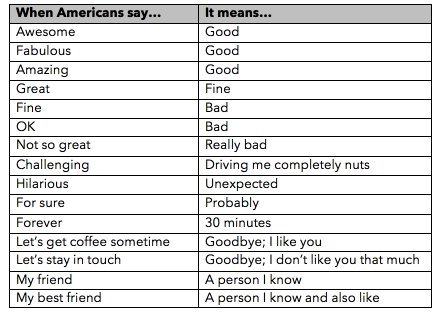
I’m afraid of Americans
380K notes
·
View notes
Text
not to be sappy on main BUT one thing that i really loved when studying linguistics was that the more important a word is, the earlier the concept of this thing was given a word. for example, the word water is similar in many similar languages (aqua, agua, água). so, the more important a word is, the more languages it’ll be similar across and the older this word will be, theoretically and generally speaking (many other things also affect this)
AND SO in my years studying linguistics, there was one word that was nearly identical across so many regionally different languages (though there are outliers of course), from europe to most of asia to subsaharan africa to indigenous languages. across nearly all languages this is the first word people learn how to say and maybe the first word humans in general officially named and defined:
mamãe - portuguese
妈妈 (māmā) - chinese
ਮੰਮੀ (mamī) - punjabi
mamah - mayan (yucatec)
мама - bulgarian, russian, ukrainian
ماں (mäm) - urdu
মা (mā) - bengali
mẹ (may) - vietnamese
ママ (mama) - japanese
అమ్మ (am'ma) - telugu
mama - quechua
મમ્મી (mam'mī) - gujarati
അമ്മ (am'ma) - malayalam
amá - navajo
엄마 (omma) - korean
eme - native hawaiian
onam - uzbek
aana - yupik
mema - tagish
μαμά (mamá) - greek
mama - swahili
أمي (umi) - arabic
mayi - chichewa
माँ (ma) - hindi
mam - dutch
ម៉ាក់ (ma) - khmer
แม่ (mæ̀) - thai
அம்மா (am'mā) - tamil
අම්මා (ammā) - sinhala
amai - zulu
ama - basque
आमा (āmā) - nepali
အမေ (amay) - myanmar (burmese)
mamá - spanish
mom/mum- english
this isn’t actually the first word because we teach babies this word (most likely), but because the “mama” or “ama” sounds are the easiest things for babies to say, and it’s nearly always the only thing they can say at first, and adults across all languages defined their language around that.
babies all over the world for thousands and thousands of years all started out blabbering sounds like “mama” and mothers everywhere were all like Oh Shit That’s Me! I’m Mama!
136K notes
·
View notes
